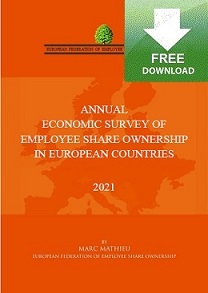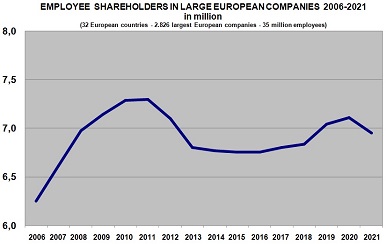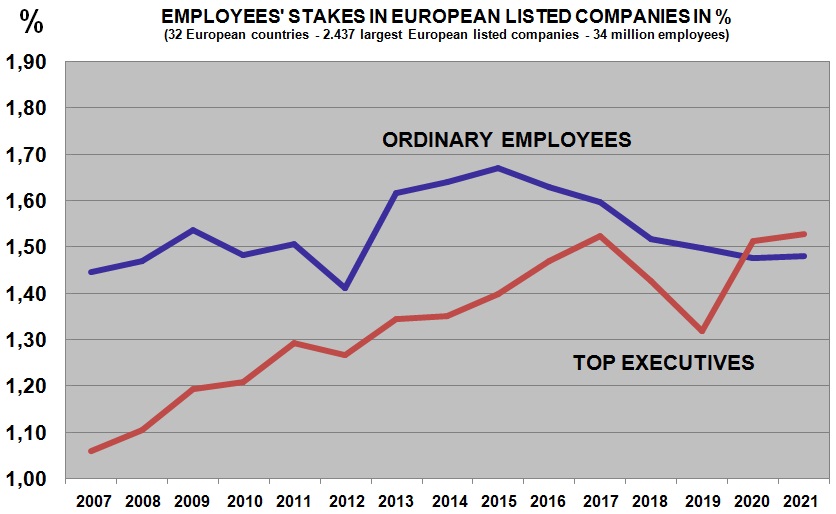| |
ECONOMIC
SURVEY OF EMPLOYEE SHARE OWNERSHIP
IN EUROPEAN COUNTRIES IN 2021

|
|
249
pages
evolution
2006-2021
main findings of census 2021
more than 100 tables and graphs
democratization rate in various countries
list of all most remarkable companies
ordinary employees and top executives
employee representation on boards
discrimination in voting rights
ownership control
listed companies
employee-owned
non-listed
companies
and much more
An
exhaustive picture based on the EFES database
(the 2.800 European companies gathering 95%
of employment in all European listed companies).
|
in partnership with


|
 Employee
share ownership in Europe in 2021
Employee
share ownership in Europe in 2021 |
|
New
progression for employee shareholders in Europe
last year, with a capitalization held of 433
billion Euro in shares in their companies,
a new record figure. Happy news for all
those who can benefit from employee share
plans.
The development of employee share ownership
has continued in large European companies
in 2021. More and more of them are organizing
employee share plans. In 2021, 88% of all
large European companies had employee share
plans of all kinds, while 53% had "broad-based"
plans for all employees, and 60% had stock
option plans. Finally, 32% of all large European
companies launched new employee share plans,
a proportion that tends to increase from year
to year.
However employee share ownership is in
danger within Europe. It is becoming less
and less democratic. The number
of employee shareholders decreased last year
and it is lower than it was ten years before;
7 million employee shareholders are now recorded
in large companies; if we add one million
in SMEs, the total number in Europe reaches
8 million (Graph 1). The fall in the
democratization rate of employee share ownership
has been dramatic over the last ten years.
And the employees' stake in the ownership
structure of large European companies is decreasing
for five years now.
In addition, a shift has occurred between
the share held by top executives and that
of ordinary employees, that of democratic
employee share ownership. For the first time
in European listed companies, the share held
by top executives exceeds that of ordinary
employees (Graph 2). In fact, as recently
as 15 years ago, the top executives as a whole
held 1.06% compared to 1.45% for ordinary
employees; today it is 1.53% for the top executives
compared to 1.48% for the others. A group
of 10,000 top executives (on average four
in each company) now owns more than the 34
million employees of large European companies.
That’s more than 20 million Euros on average
for each top executive, and 30,000 for each
ordinary employee shareholder.
|
Graph
1

Graph 2

|
It should also be noted that the share held by ordinary
employees is back to the same level as fifteen years
ago. This observation sanctions Europe's failure
to promote a democratic employee share ownership
policy.
Promoting democratic employee ownership is indeed
a political choice, usually supported by fiscal
incentives. Without support, the average employee
cannot afford to invest financially in his or her
company. Few European countries do this effectively.
On
the contrary, we observe that the top executives
have not lacked the resources to do so. Have public
policies to support employee share ownership, where
they exist, been poorly calibrated and misused by
top executives? We can see that this is not the
case; in fact, the share of the 1.53% resulting
from the exercise of stock options and other plans
is microscopic, representing only 0.05%.
However, where, in which countries has the share
of top executives multiplied the most over the last
fifteen years, and where has it been contained?
The share of top executives increased the most in
countries where democratic share plans are most
absent. Where has the share of top executives been
contained? Where democratic employee ownership is
most significant. This is particularly the case
in France, the country with the highest share of
ordinary employees in Europe (3.50%), and the rare
country where the share of top executives has not
soared, since it is now at the same level as fifteen
years ago (1.05%).
The facts are plain to see: Democratic employee
ownership is a guarantee of balance. Its absence
or weakness opens the door to the soaring share
held by top executives.
 Your
comments
Your
comments |
|
| |
"Bravo
pour ce rapport très clair et complet !"
"Wow,
what a great work. Congratulations. That's
very helpful for our activities!"
"Salve
vi invio la mia tesi magistrale sull'azionariato
dei dipendenti in Italia e vi ringrazio perché
dal vostro lavoro ho potuto prendere spunti
interessanti."
"Anyway
thanks to you and your hard work, and your
wonderful reports - I am an associate professor
now, so thank you very much for your help.
Now I am preparing this version in English,
so I try to put the most recent data."
"That's
really great work! Congratulations and thank
you. I think the survey is very helpful for
the discussion here in Germany. We will publish
it on our homepage and distribute the paper
in our network. Best wishes"
"Merci
pour ce travail récurrent si précieux !"
"Remarkable
work ! Thanks and congratulation".
"Nous
sommes en phase de finalisation du texte concernant
une saisine au CESE en France. Votre publication
pourrait nous être fort utile."
"Muchas
gracias por la información y felicitaciones..."
"I would be very eager to update my analysis
based on new data."
"Can
you provide data on individual companies,
e.g. in an excel spread sheet, so we can see
which companies have stock options? This would
be very useful for our statistical analysis."
"Sans
votre soutien précieux, en m'aidant à constituer
la base de données statistiques ayant permis
la réalisation des deux études quantitatives
longitudinales de l'impact de l'actionnariat
salarié sur la performance des grandes entreprises
françaises cotées, ma thèse n'aurait pas pu
voir le jour."
|
 Database
of European companies
Database
of European companies
The data are
available for analysing companies, for benchmarking,
for market research, as well as for research work
and teaching, and for macroeconomic analysis. The
database gathers economic and financial information
about employee ownership in the 2.800 largest European
companies, including listed and non-listed companies.
More
information
 The
European Employee Ownership Top 100
The
European Employee Ownership Top 100
The
European Employee Ownership TOP 100 is designed
with respect to two rankings of Europe's largest
companies, considering employee ownership. In the
EUROCAP100 ranking, companies are ranked by equity
held by employees, in million Euro. In the EUROEMP100
ranking, companies that are 50% or more employee-owned
are ranked by number of employees. Both rankings
are published in the Economic Survey.
 Countries
Countries
Each European country can easily be compared to
others through a specific country file, using a
set of 10 graphs, using fully comparable information.
Archives:
 Survey 2020
Survey 2020
 Survey 2019
Survey 2019
 Survey 2018
Survey 2018
 Survey 2017
Survey 2017
 Survey 2016
Survey 2016
 Survey 2015
Survey 2015
 Survey 2014
Survey 2014
 Survey 2013
Survey 2013
 Survey 2012
Survey 2012
 Survey
2011
Survey
2011
 Survey
2010
Survey
2010  Survey
2009
Survey
2009  Survey
2008
Survey
2008  Survey
2007
Survey
2007
|
|